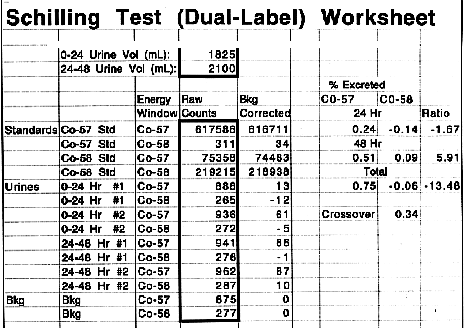

The 48-hour urinary excretion of Co-58 cyanocobalamin without intrinsic factor is 0% of the administered dose. The 48 hour excretion of the Co-57 cyanocobalamin-intrinsic factor complex is 0.75% of the administered dose.
View main image(ge) in a separate image viewer
Full history/Diagnosis is available below
To establish the cause of vitamin B12 deficiency, vitamin B12 absorption tests have been devised. At the Mallinckrodt Institute of Radiology, we utilize a dual-label Schilling test. For the study, the patient is asked to fast overnight. No parenteral vitamin B12 is given for at least one week prior to the study and oral vitamin preparations containing vitamin B12 are withheld for at least 48 hours. The patient is subsequently given one capsule of Co-58 labeled vitamin B12. One hour later, the patient is given one capsule of Co-57 labeled vitamin B12 complexed with intrinsic factor. One hour after the second capsule is given, 1 mg of vitamin B12 is administered intramuscularly in the deltoid muscle. This last step is then repeated 24 hours latter. By administering a large amount of unlabeled vitamin B12 and saturating transcobalamin, most of the radioactive vitamin B12 absorbed into the blood remains unbound to protein and, thus, is excreted into the urine by glomerular filtration. The patient is asked to save all urine for 48 hours as two separate, sequential 24-hour collections. The urine radioactivity is determined by counting in vitro and compared with counts in a standard. In a normal person, urinary excretion is from 10- 25% of the administered radioactivity. Urinary excretion of less than 5% is compatible with impaired absorption. In patients with intrinsic factor deficiency, there is discordance in the urinary excretion of vitamin B12 without and with intrinsic factor. The percent urinary excretion of the Co-58 labeled vitamin B12 is abnormally low whereas the excretion of Co-57 labeled vitamin B12 complexed with intrinsic factor is normal. In patients with impaired absorption secondary to intestinal disease (or competition from microorganisms), the percent urinary excretion of both labeled complexes remains abnormally low.
references: Wagner HN Jr., Szabo Z, Buchanan JW. Eds. Principles of Nuclear Medicine, second edition. WB Saunders Co., Philadelphia, PA, 1995; pp 701.
View followup image(gs). Small-bowel-follow-through demonstrates multiple diverticula. There was no other history to suggest primary intestinal disease. Thus, the presumptive diagnosis was bacterial overgrowth associated with small intestinal diverticular disease.
References and General Discussion of Schilling Test (Anatomic field:Gasterointestinal System, Category:Metabolic, endocrine, toxic)
Return to the Teaching File home page.